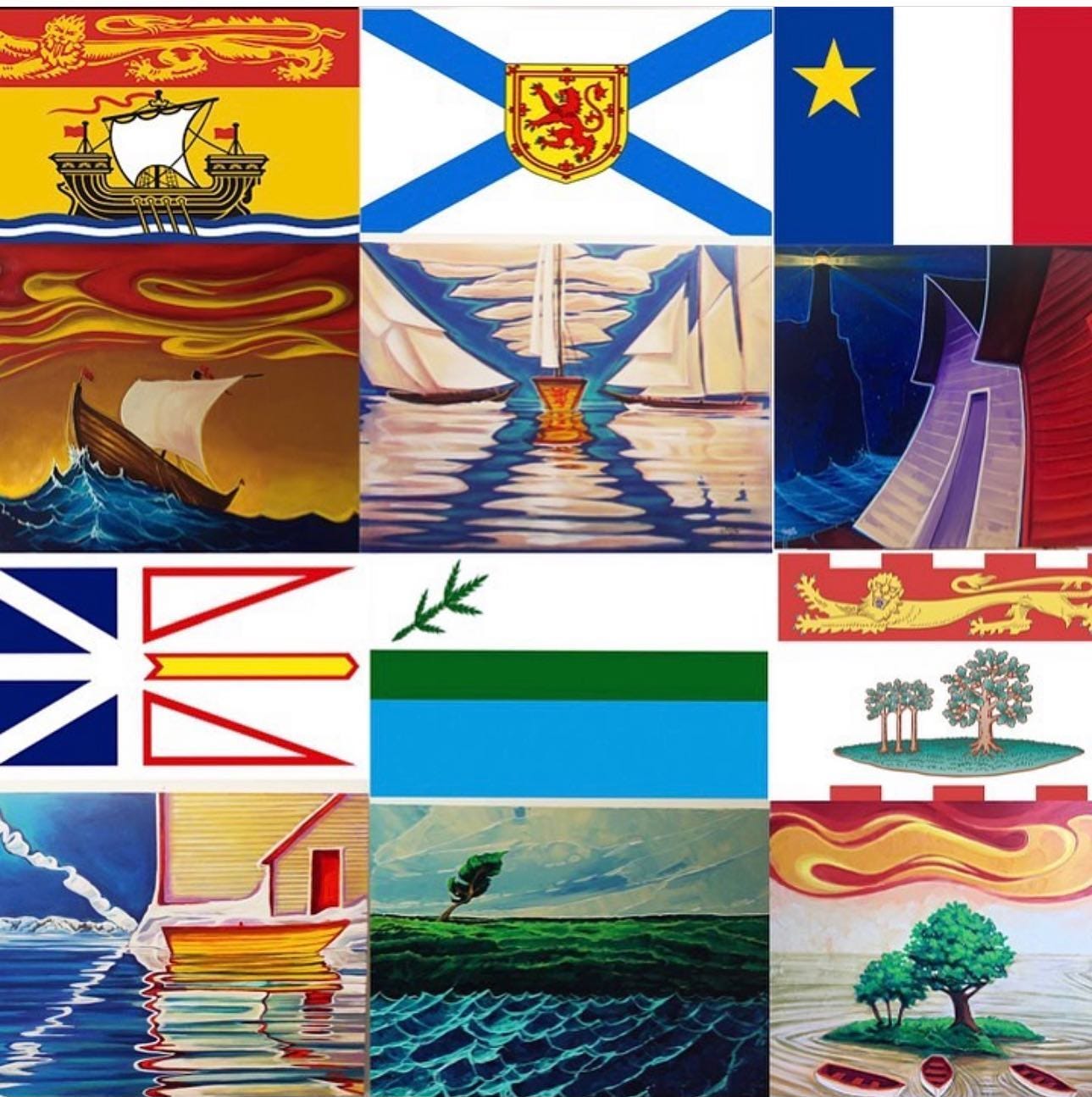Democracy Doesn't Look Back
Are you voting Past, Present, of Future? As you head to the polls this week, here’s what matters more than party colours, past grievances, and mean memes.
I like the new folklore expression,
“There’s a reason the rear-view mirror is smaller than the windshield — because what’s in front of you is more important than what’s behind you.”
Researching, I couldn’t find it any further back than the last 20 years or so, but to me it’s a timeless truth. I like how allegory or metaphor, illustrated with symbols, can come to you more quickly, with deeper meaning in times of need, than all the words in the world.
It’s a great metaphor to have in mind as you head to the polls this week. The rearview mirror is small because the past should inform, not dominate. The windshield is large because the future is where we’re headed—and that’s where our focus belongs.
The people don’t vote backwards. They don’t vote to restore the past—they vote for change, to redirect the flow. Every election is a question about what’s next, not what was. Even the politicians who trade in nostalgia are only doing it to sell a version of tomorrow that feels familiar.
Elections are about change. You will rarely hear an election promise of ‘more of the same’. Even Nova Scotia’s the most famous example of tried and true, Angus L. MacDonald was always imagining and working toward a vision of the future built on a foundation of the past.
All’s Well With Angus L.
Angus L. Macdonald was, by every meaningful measure, Nova Scotia’s most successful, storied, and consequential premier. He didn’t just hold office—he reshaped the role itself. In a province that had long been neglected by the Confederation it helped create, Macdonald brought dignity, ambition, and a sweeping sense of purpose. He governed not as a provincial manager but as a nation-builder in miniature, insisting that Nova Scotia deserved more than scraps from Ottawa’s table. Under his leadership, the province got roads, schools, electrification, modern governance—and something even rarer: belief in itself.
Haligonia has argued he was a total badass: Shot by a sniper in the neck in WWI, he took over his regiment when all the officers were killed and led soliders through all those famous Canadian battles you hear about on Rememberance Day and anniversaries. Macdonald’s premiership straddled the Depression, World War II, and the uncertain postwar future. He was so well respected in Canada that he was seconded from being premier to be the Minister of National Defence in WWII, and is credited with building Canada’s navy to meet the U-Boat threat and keep convoys safe through the war. along the way, bringing prosperity to Halifax and Nova Scotia.
But it was his postwar return to Nova Scotia that solidified his legacy. He poured energy into education, pushed for infrastructure to connect rural and urban regions, and cultivated a civil service based on merit rather than patronage. He balanced boldness with pragmatism and made it clear that good government was not a distant dream but a matter of moral responsibility. No premier before or since has commanded such a blend of national vision and local devotion—or left behind a legacy still visible in the province’s bones… and bridges.
VOTING IN THE PRESENT
The mistake is thinking democracy even has a rearview mirror. It doesn’t. It has a windshield. And it barrels forward—messy, wild, improvised—with all of us on board.
The present is the fruit of the past and the seed of the future.
It’s that seed that matters.
Sure, sometimes we take a wrong turn and have to find our way. Sometimes we leave important ideas behind and have to go back for them. Sometimes we want to return again to our favourite spots by the road. But that’s not the past. That’s not going backward. That’s returning again.
The idea is that holding onto past grievances or failures is akin to carrying unnecessary baggage, which can weigh down one's journey and obscure the opportunities that lie ahead.
We can only use the past as a very limited guide. Focusing on past events can blind individuals to the new paths and opportunities that are unfolding before them.
We can use the rearview mirror and windshield metaphor to inspire a forward-looking mindset, encouraging us as Canadians to imagine the future with hope and confidence. The open road is ahead — long and wide — filled with opportunity and promise no matter what was in the review mirror. Imagine how Nova Scotian’s felt after WWI, The Depression, and WWII. It would have been impossible for any reasonable person in the spring of 1945 to strike a very optimistic tone about what was to come. Economically? Socially? We were devastated. In ruins. And yet what came next was the greatest, fastest, and most sustained period of progress and human florishing in history.
The myth is that democracy draws deeply from the well of collective memory—that we “learn from the past,” that “history repeats,” that we “stand on the shoulders of giants.” But democracy, as it’s practiced, is not some a lesson learned by rote and repeated. It’s a forward-leaning creature. It takes unknown, undeveloped, unimagined boxes of parts and begins to build. It is, by nature, a system creating what’s next, not what’s past.
The ballot should never be a referendum on yesterday. Voters aren’t offered a menu of history’s greatest hits. They’re presented with choices—sometimes uninspiring, sometimes outrageous—about the future. Even when a candidate celebrates the past like comfort food (“Make … Great Again!”), what they’re selling is a vision of tomorrow, lacquered in a bit of sepia-tone sentimentality. The real business of democracy is the negotiation of what comes next.
Democracy, like hope, forgiveness, and charity, thrives on forgetfulness and reinvention. It allows for second acts, wild swings, and sudden pivots. It forgives yesterday’s errors and obsesses over tomorrow’s promises. The archive is there if you want it, but the polling booth is a machine for making the new.
In moments of crisis, people don’t vote for a restoration; they vote for change. Old ideas and traditions may haunt the campaign trail, but they don’t win the day—at least, not without being repackaged, rebranded, and rebooted for the present tense.
Democracy doesn’t look back because it can’t afford to. Its purpose is fixed, for better or worse, on the next thing, the next promise, the next possibility. And for all the mess that causes, it’s also what keeps democracy alive.
FOR THE FUTURE
You’ll find it in the fine print of financial reports, investor presentations, and earnings calls.
“This presentation contains forward-looking statements, which reflect management’s current expectations regarding future events. These statements are subject to risks and uncertainties, and actual results may differ materially.”
Translation? We’re telling you what we hope and plan will happen—not what’s guaranteed to happen. The future is uncertain, and you’ve been warned.
It’s basically legalese for: “We’re about to make some educated guesses, and if they don’t come true, don’t sue us.”
Every election campaign is a forward-looking statement.
Political platforms, promises, speeches, ads—they're all speculative projections dressed up in certainty.
Candidates don’t run on audited performance reports. They run on forecasts. They say things like “We will build more homes,” or “We’ll cut your taxes,” or “We’ll fight for you.” But these are, quite literally, forward-looking statements: subject to risks, uncertainties, institutional bottlenecks, global economic forces, public mood swings, and the stubborn inertia of bureaucracy.
If a politician had to issue a disclaimer, it might look like this:
“This campaign contains forward-looking statements, which reflect the candidate’s current hopes, polling data, and vibes. Results may vary wildly depending on opposition antics, bureaucratic resistance, media spin, and whether the public still likes us in 18 months.”
When heading to the polls, remember: you're not just voting on track records. You’re voting on projections. And just like in finance, it’s wise to ask: What are the underlying assumptions? What’s the risk profile? And who’s actually capable of executing the plan—not just pitching it?
Voting, like investing, is about trust in the future—tempered with a little due diligence.
Some people can handle this uncertainty. Some can’t. At the root of this divide is how individuals process ambiguity and disappointment. Psychologically, many people are wired to seek certainty—about the world, about outcomes, about their own sense of control. A political promise can feel, to some, like a contract. When reality fails to deliver, it’s not just disappointing—it feels like betrayal.
That’s why, instead of interpreting unmet promises as a failure of prediction, many people experience them as a failure of character. The politician didn’t just get it wrong—they lied. The party didn’t just hit a bureaucratic wall—they betrayed us. This collapse from optimism into cynicism is dramatic, but deeply human. It’s a defence mechanism: If the world is full of liars, at least you’re not the fool.
Ahead of the election we see it in response to polls.
Polls Are Forward-Looking Statements, Too
Just like campaign promises, polls are misunderstood predictions, often mistaken for certainties. But a poll is not a prophecy. It’s a snapshot of opinion under specific conditions, estimates and assumptions, at a specific moment, within a margin of error. It’s a probabilistic model, not a guarantee. And yet, every election cycle, we see people respond to polling with either overconfidence (“We’ve got this in the bag!”) or outrage (“The pollsters lied to us!”).
The same binary thinking applies: If a poll “gets it wrong,” it must have been dishonest. If the outcome surprises us, someone must have been manipulating the truth.
But in reality, the assumption list and margin of error aren’t footnotes—they are the whole story.
Shared Root Cause: Discomfort with Uncertainty
In both cases—campaign promises and election polls—there’s a deep discomfort with probabilistic thinking. People want results to align with their emotional investments. When the results don’t line up, they don’t re-examine the assumptions; they blame the messenger.
“The politician lied.”
“The poll was rigged.”
“The media is gaslighting us.”
This is the psychology of broken belief systems trying to make sense of a messy, unpredictable world.
THE BEE Has Explored This Before: The Future Can’t Be Written.
People are generally okay with weather forecasts being “off”— nature is complex in the estreme — but expect politics to deliver certainty, clarity, and control. That’s not realistic. Democracy, polling, and campaign promises all live in the same domain of contingent futures. They offer best guesses, not binding contracts.
Zooming out, we live in a time where trust in institutions is at a generational low. That shapes the way people hear political promises. If you don’t believe the system works, any delay or detour is taken as proof that it’s rigged. And that narrative is sticky—it confirms a worldview, feeds outrage, and spreads easily.
In this context, a forward-looking statement can sound like a scam by default. The politician may be sincere, but the listener has already decided that nothing works, nobody delivers, and anyone saying otherwise must be faking it. It’s not just a policy reaction—it’s a cultural posture.
Clear out the problems of the past and the present. Take time to imagine the future — the Nova Scotia and Canada everyone is waiting for.
So off we go to vote. With our eyes open and our mind steady. Focused on the future filled with opportunity and promise no matter what the past.
Campaigns are full of forward-looking statements—not guarantees, but possibilities. Polls are snapshots, not scripts. And democracy, at its best, doesn’t promise perfection—it invites participation.
You’re not voting for certainty. You’re voting for direction. The dreams and nightmares we have alone come to nothing. But the things we imagine and dream together — that’s what the future is actually made from.







